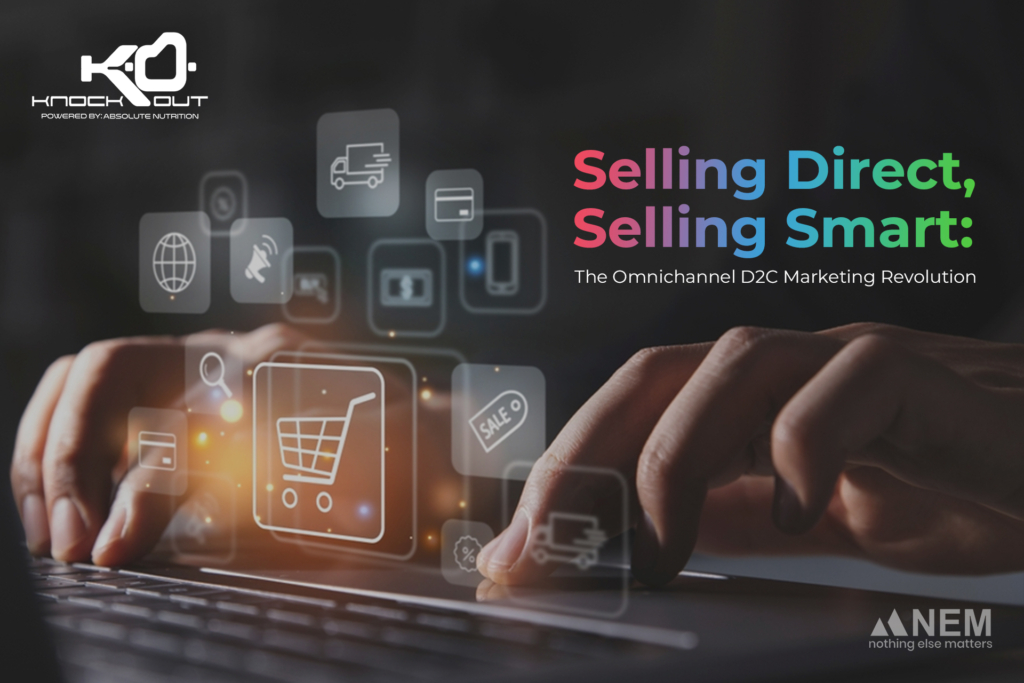Selling Direct, Selling Smart: The Omnichannel D2C Marketing Revolution

Omnichannel D2C (direct-to-consumer) marketing refers to a strategy where a company uses multiple channels, such as social media, email, and in-person events, to connect with and sell directly to customers. The goal of an omnichannel D2C strategy is to create a seamless experience for customers across all channels so that they can engage with the brand on their terms. This can include syncing inventory, using a unified customer database, and creating personalised marketing campaigns. Using an omnichannel approach, companies can build stronger customer relationships and increase sales and revenue.
An omnichannel D2C marketing strategy creates a cohesive and consistent customer experience across all channels and involves a variety of tactics and techniques, such as:
– Syncing inventory across all channels: Ensuring customers can purchase products or services through any medium, online or offline.
– Using a unified customer database: Allowing customers to be recognized and treated as the same person regardless of their channel.
– Personalised marketing campaigns: Creating targeted marketing messages and offers based on customers’ browsing and purchase history and preferences.
– Consistent branding and messaging: Using the same branding, messaging, and visual elements across all channels to create a consistent experience.
– Integrated analytics: Collecting and analysing data from all channels to measure the effectiveness of marketing campaigns and optimise future strategies.
– Multi-Channel customer service: Providing customer service through multiple channels such as phone, email, chat, and social media to improve customer experience.
An omnichannel D2C marketing strategy aims to create a smooth buying journey for the customer, leading to increased customer satisfaction, higher sales, and a greater lifetime value for the customer. It’s essential to remember that implementing an omnichannel strategy can be challenging and requires a lot of resources and time. But if done correctly, it can act as the ultimate growth facilitator for any brand.
For Absolute’s KnockOut range of supplements, adopting the omnichannel approach from the get-go was the best bet. With Absolute’s decade-long legacy as a premium Indian-made health supplement brand, the KnockOut range offers an innovative line of supplements for bodybuilders, hard-training athletes, and fitness enthusiasts. A high-quality, trust-worthy product like this deserved a solid strategy to help them holistically reach their core consumers. And that’s precisely what we did as their marketing support.
KnockOut leveraged an Omnichannel presence, and NEM helped the brand unify their messaging, targeted core consumers from focused data banks, and implemented a vastly successful e-commerce selling strategy.
Check out our case study about how we bagged the prestigious IAMAI Award for the Best Omnichannel Strategy for assisting KnockOut reach from INR 2 Lakhs a month in sales at launch to INR 2 Lakh a day in sales.
According to Boat’s co-founder Aman Gupta, direct-to-consumer (D2C) as an industry is evolving but omnichannel is the way forward (for e-commerce). Initially an online brand, BoAt had its investors sceptical about the company’s ability to generate a justifiable revenue stream. But the brand reached INR 100 Cr and is on the road to becoming an INR 500 Cr consumer electronics company by 2024. BoAt’s immense growth trajectory has caused a shift in mindset to the extent that investors are looking for D2C startups to get added to their portfolios. The brand enjoys a close to 20% market hold in the Indian wearable watch market and over 30% in the truly wireless audio wear space.
It’s essential to keep in mind that implementing an omnichannel strategy can be challenging and requires a lot of time and resources. Considering that, here are a few tips to help you grow your business with an Ominichal approach:
– Prioritise customer experience: Keep the customer experience at the forefront of your strategy. Think about how your customers interact with your brand across all channels and how you can make that experience as seamless and consistent as possible.
– Use data-driven decision-making: Use data to understand how customers interact with your brand across all channels and use that information to make informed decisions about your strategy.
– Create a mobile-first strategy: With the increasing usage of mobile devices, it is crucial to create a mobile-first approach to ensure that the customer experience is optimised for mobile.
– Invest in technology: Invest in the right technology to support your omnichannel strategy. This may include a CRM system, inventory management software, and analytics tools.
– Test and improve: Continuously test and evaluate your strategy, and make adjustments as needed. Be open to feedback and be willing to make changes in order to enhance the customer experience.
– Align with your company culture and values: Your omnichannel strategy should align with your company culture, values and mission. It should be an extension of the company’s identity and not just a marketing strategy.
Or, you could get in touch with us and we’ll help you build your brand, reach your customers and make them your fans.
Brilliant Ideas & Ruthless Execution
Nothing Else Matters

